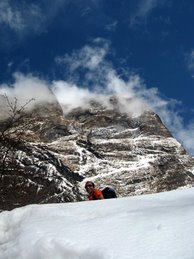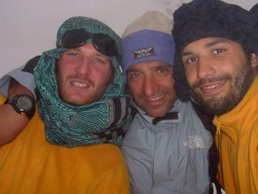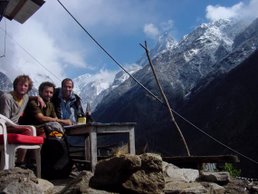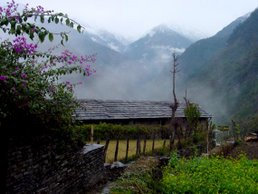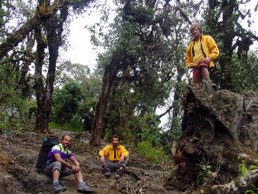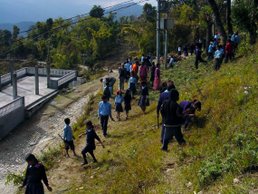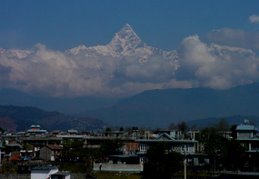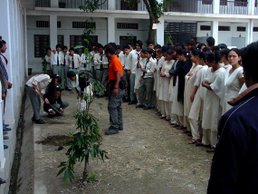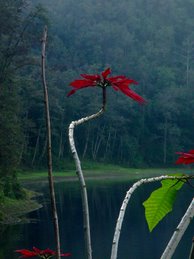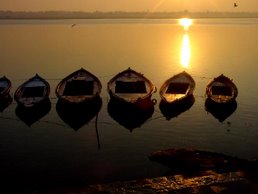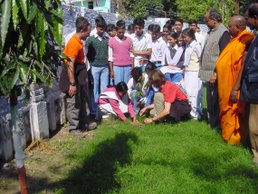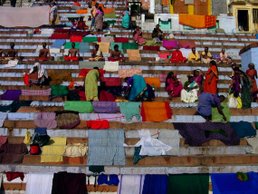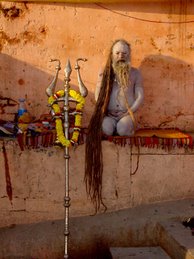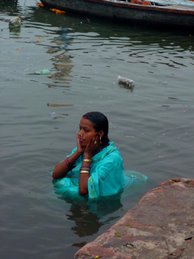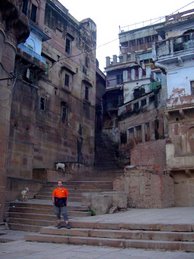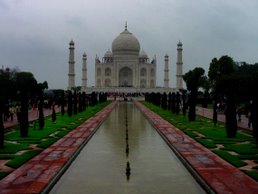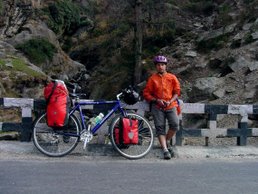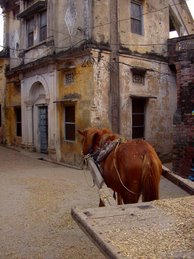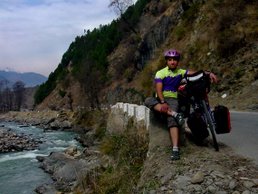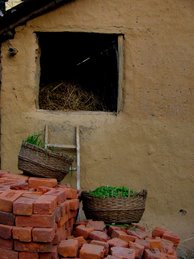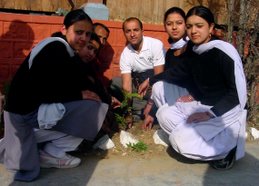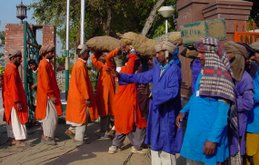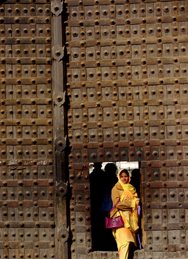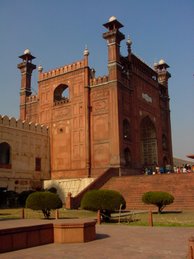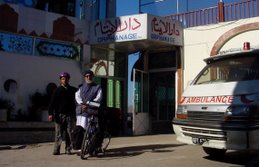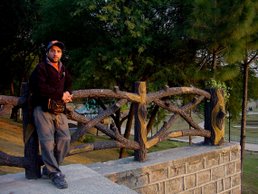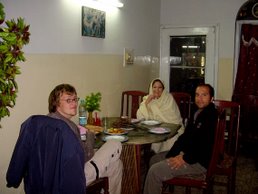
Culture
_______________________
Iranian cyclist tours world on tree-planting missionAmelia ThomasMiddle East TimesAugust 2, 2007
TREE-MENDOUS MISSION: Mohammad Tajeran, a 31-year-old Iranian engineer and environmentalist poses beneath a tree in Angkor Wat, Cambodia. Tajeran is on a solo cycling trip across the world, aiming to plant trees in every country he passes through. (Mohammad Tajeran)
TEL AVIV -- When 31-year-old Mohammad Tajeran, an Iranian mechanical engineering graduate, arrived July 25 in the Vietnamese capital, Ho Chi Minh City, his first stop was neither to admire its historical pagodas nor its colorful markets. Instead, he headed straight off to make arrangements for a different type of diversion: tree-planting. Tajeran, a keen cyclist, climber, and conservationist, is on a solo, round-the-world bicycle trip to promote his mission and motto: "We Need Trees." Until 2004, he explains in a telephone interview with the Middle East Times, his life was an ordinary albeit successful one, running his own lucrative firm, designing heating and cooling systems for buildings. "Then, almost three years ago," he relates, "during a climbing expedition, I felt something strange inside. I couldn't follow the team, and just sat on a stone, looking at the moon." It was then, he recalls, that he realized his life must change - whereupon he immediately phoned his mother to share the news that he intended to pursue his childhood dream: to cycle around the world. As a keen naturalist, he felt that a simple pleasure tour was out of the question. He would, he decided, travel across the world, planting trees in cities and local communities en route to raising awareness of the importance of a green and arboreal environment. Dissatisfied with Iranian environmental efforts that weren't doing enough to protect nature, Tajeran says he decided to spread the ecological message, elsewhere, while simultaneously relaying the story of his voyage, and the importance of his mission, back home to Iran. Thus, his campaign was born. In preparation for the journey, he abandoned his comfortable life, closing his office, raising funds, and learning English for the trip. At that point, he had no plan for how long he might be gone, but kn ew it would, most likely, be several years. After months of frustrating and fruitless fundraising efforts, however, he had still not secured a sponsor for the trip. "But," says Tajeran, "I trusted to my unconscious ... I always get answers through a dream or a feeling." The dream in which he received his answer came to him soon after. According to Tajeran, it indicated that a lack of money should not keep him from his quest. A month later, in 2004, he was ready to hit the road. Then, disaster struck. While climbing, Tajeran shattered his arm and shoulder, requiring repeated surgery and physiotherapy. The last of his savings ran out, and his dream seemed further from being realized than ever. "Everyone said: 'Hey guy, you're losing your life and wasting your time,'" he recalls. Eight months later, penniless and with serious injuries, he was no closer to achieving his goal, without money enough even to pay his mounting hospital bills. While his fellow mechanical engineers were earning high salaries, and enjoying bright prospects, Tajeran, it seemed, had lost everything. Then, almost two years later, another breakthrough came Tajeran's way. He received, by mail, a check for $500 from a Swiss couple who had learned of his fundraising efforts, and wished to help him take the first step. Immediately, he took it. On December 5, 2006, Tajeran planted his first tree in his home town of Masshad, Iran, bade his friends and family farewell, and set off on his mission. Three days later, he reached Pakistan overland with just $300 in his pocket, a backpack, and a bicycle. He arrived in Quetta December 9, and planted his first trees outside Iran in the city's Merghondy Park. To date, Tajeran has passed through India, Nepal, Bangladesh, Malaysia, Thailand, and Cambodia, all the while planting trees with the help of communities, environmental activists, and forestry commissions en route. As well as locals, he has encountered dozens of international travelers to whom he has passed on his message, many promising to plant a tree, or several, on his behalf, on their return home. Tajeran's trees are now flourishing in Lahore, Islamabad, Varanasi, Dharmsala, Kampot, and in dozens of more remote and rural locations. "In Pokhara, Nepal, we planted 300 saplings with students from a local school," says Tajeran. "In Katmandu, I had a Dutch roommate, whose mother sent $30 for me to buy trees to plant with children." Each time someone gives him a donation - however small - toward his mission, it gives him renewed vigor to continue. "It means that Mohammad's way is important for someone ... so, just go, go, go!" However, it has not all been plain cycling. The most difficult part of Tajeran's trip so far came in Ranipur, India, where he was refused a dormitory bed on the grounds that, as an Iranian, he might be a terrorist, and a danger. Tajeran, proud of his Iranian heritage, found alternative accommodation elsewhere. "I am from a country with 3,000 years of culture," he reflects, adding that one of the world's first humanitarian declarations was penned by Cyrus the Great, a Persian king. Heading next for Laos and China after Vietnam, he aims to take his message even further - as far as his luck, and leg muscles, will allow him to go. Tajeran's plan encompasses roughly five more years in the saddle, allowing for deviations and detours along the way. "I want to devote my life to nature and to trees," he smiles, adding that "since that first $300, I've been on the road for 243 days, and I'm still alive." Nonetheless, "this isn't a work by Mohammad Tajeran," he stresses. "We are working together for our earth, and everyone has to do something to take part."
ew it would, most likely, be several years. After months of frustrating and fruitless fundraising efforts, however, he had still not secured a sponsor for the trip. "But," says Tajeran, "I trusted to my unconscious ... I always get answers through a dream or a feeling." The dream in which he received his answer came to him soon after. According to Tajeran, it indicated that a lack of money should not keep him from his quest. A month later, in 2004, he was ready to hit the road. Then, disaster struck. While climbing, Tajeran shattered his arm and shoulder, requiring repeated surgery and physiotherapy. The last of his savings ran out, and his dream seemed further from being realized than ever. "Everyone said: 'Hey guy, you're losing your life and wasting your time,'" he recalls. Eight months later, penniless and with serious injuries, he was no closer to achieving his goal, without money enough even to pay his mounting hospital bills. While his fellow mechanical engineers were earning high salaries, and enjoying bright prospects, Tajeran, it seemed, had lost everything. Then, almost two years later, another breakthrough came Tajeran's way. He received, by mail, a check for $500 from a Swiss couple who had learned of his fundraising efforts, and wished to help him take the first step. Immediately, he took it. On December 5, 2006, Tajeran planted his first tree in his home town of Masshad, Iran, bade his friends and family farewell, and set off on his mission. Three days later, he reached Pakistan overland with just $300 in his pocket, a backpack, and a bicycle. He arrived in Quetta December 9, and planted his first trees outside Iran in the city's Merghondy Park. To date, Tajeran has passed through India, Nepal, Bangladesh, Malaysia, Thailand, and Cambodia, all the while planting trees with the help of communities, environmental activists, and forestry commissions en route. As well as locals, he has encountered dozens of international travelers to whom he has passed on his message, many promising to plant a tree, or several, on his behalf, on their return home. Tajeran's trees are now flourishing in Lahore, Islamabad, Varanasi, Dharmsala, Kampot, and in dozens of more remote and rural locations. "In Pokhara, Nepal, we planted 300 saplings with students from a local school," says Tajeran. "In Katmandu, I had a Dutch roommate, whose mother sent $30 for me to buy trees to plant with children." Each time someone gives him a donation - however small - toward his mission, it gives him renewed vigor to continue. "It means that Mohammad's way is important for someone ... so, just go, go, go!" However, it has not all been plain cycling. The most difficult part of Tajeran's trip so far came in Ranipur, India, where he was refused a dormitory bed on the grounds that, as an Iranian, he might be a terrorist, and a danger. Tajeran, proud of his Iranian heritage, found alternative accommodation elsewhere. "I am from a country with 3,000 years of culture," he reflects, adding that one of the world's first humanitarian declarations was penned by Cyrus the Great, a Persian king. Heading next for Laos and China after Vietnam, he aims to take his message even further - as far as his luck, and leg muscles, will allow him to go. Tajeran's plan encompasses roughly five more years in the saddle, allowing for deviations and detours along the way. "I want to devote my life to nature and to trees," he smiles, adding that "since that first $300, I've been on the road for 243 days, and I'm still alive." Nonetheless, "this isn't a work by Mohammad Tajeran," he stresses. "We are working together for our earth, and everyone has to do something to take part."
Iranian cyclist tours world on tree-planting missionAmelia ThomasMiddle East TimesAugust 2, 2007
TREE-MENDOUS MISSION: Mohammad Tajeran, a 31-year-old Iranian engineer and environmentalist poses beneath a tree in Angkor Wat, Cambodia. Tajeran is on a solo cycling trip across the world, aiming to plant trees in every country he passes through. (Mohammad Tajeran)
TEL AVIV -- When 31-year-old Mohammad Tajeran, an Iranian mechanical engineering graduate, arrived July 25 in the Vietnamese capital, Ho Chi Minh City, his first stop was neither to admire its historical pagodas nor its colorful markets. Instead, he headed straight off to make arrangements for a different type of diversion: tree-planting. Tajeran, a keen cyclist, climber, and conservationist, is on a solo, round-the-world bicycle trip to promote his mission and motto: "We Need Trees." Until 2004, he explains in a telephone interview with the Middle East Times, his life was an ordinary albeit successful one, running his own lucrative firm, designing heating and cooling systems for buildings. "Then, almost three years ago," he relates, "during a climbing expedition, I felt something strange inside. I couldn't follow the team, and just sat on a stone, looking at the moon." It was then, he recalls, that he realized his life must change - whereupon he immediately phoned his mother to share the news that he intended to pursue his childhood dream: to cycle around the world. As a keen naturalist, he felt that a simple pleasure tour was out of the question. He would, he decided, travel across the world, planting trees in cities and local communities en route to raising awareness of the importance of a green and arboreal environment. Dissatisfied with Iranian environmental efforts that weren't doing enough to protect nature, Tajeran says he decided to spread the ecological message, elsewhere, while simultaneously relaying the story of his voyage, and the importance of his mission, back home to Iran. Thus, his campaign was born. In preparation for the journey, he abandoned his comfortable life, closing his office, raising funds, and learning English for the trip. At that point, he had no plan for how long he might be gone, but kn
 ew it would, most likely, be several years. After months of frustrating and fruitless fundraising efforts, however, he had still not secured a sponsor for the trip. "But," says Tajeran, "I trusted to my unconscious ... I always get answers through a dream or a feeling." The dream in which he received his answer came to him soon after. According to Tajeran, it indicated that a lack of money should not keep him from his quest. A month later, in 2004, he was ready to hit the road. Then, disaster struck. While climbing, Tajeran shattered his arm and shoulder, requiring repeated surgery and physiotherapy. The last of his savings ran out, and his dream seemed further from being realized than ever. "Everyone said: 'Hey guy, you're losing your life and wasting your time,'" he recalls. Eight months later, penniless and with serious injuries, he was no closer to achieving his goal, without money enough even to pay his mounting hospital bills. While his fellow mechanical engineers were earning high salaries, and enjoying bright prospects, Tajeran, it seemed, had lost everything. Then, almost two years later, another breakthrough came Tajeran's way. He received, by mail, a check for $500 from a Swiss couple who had learned of his fundraising efforts, and wished to help him take the first step. Immediately, he took it. On December 5, 2006, Tajeran planted his first tree in his home town of Masshad, Iran, bade his friends and family farewell, and set off on his mission. Three days later, he reached Pakistan overland with just $300 in his pocket, a backpack, and a bicycle. He arrived in Quetta December 9, and planted his first trees outside Iran in the city's Merghondy Park. To date, Tajeran has passed through India, Nepal, Bangladesh, Malaysia, Thailand, and Cambodia, all the while planting trees with the help of communities, environmental activists, and forestry commissions en route. As well as locals, he has encountered dozens of international travelers to whom he has passed on his message, many promising to plant a tree, or several, on his behalf, on their return home. Tajeran's trees are now flourishing in Lahore, Islamabad, Varanasi, Dharmsala, Kampot, and in dozens of more remote and rural locations. "In Pokhara, Nepal, we planted 300 saplings with students from a local school," says Tajeran. "In Katmandu, I had a Dutch roommate, whose mother sent $30 for me to buy trees to plant with children." Each time someone gives him a donation - however small - toward his mission, it gives him renewed vigor to continue. "It means that Mohammad's way is important for someone ... so, just go, go, go!" However, it has not all been plain cycling. The most difficult part of Tajeran's trip so far came in Ranipur, India, where he was refused a dormitory bed on the grounds that, as an Iranian, he might be a terrorist, and a danger. Tajeran, proud of his Iranian heritage, found alternative accommodation elsewhere. "I am from a country with 3,000 years of culture," he reflects, adding that one of the world's first humanitarian declarations was penned by Cyrus the Great, a Persian king. Heading next for Laos and China after Vietnam, he aims to take his message even further - as far as his luck, and leg muscles, will allow him to go. Tajeran's plan encompasses roughly five more years in the saddle, allowing for deviations and detours along the way. "I want to devote my life to nature and to trees," he smiles, adding that "since that first $300, I've been on the road for 243 days, and I'm still alive." Nonetheless, "this isn't a work by Mohammad Tajeran," he stresses. "We are working together for our earth, and everyone has to do something to take part."
ew it would, most likely, be several years. After months of frustrating and fruitless fundraising efforts, however, he had still not secured a sponsor for the trip. "But," says Tajeran, "I trusted to my unconscious ... I always get answers through a dream or a feeling." The dream in which he received his answer came to him soon after. According to Tajeran, it indicated that a lack of money should not keep him from his quest. A month later, in 2004, he was ready to hit the road. Then, disaster struck. While climbing, Tajeran shattered his arm and shoulder, requiring repeated surgery and physiotherapy. The last of his savings ran out, and his dream seemed further from being realized than ever. "Everyone said: 'Hey guy, you're losing your life and wasting your time,'" he recalls. Eight months later, penniless and with serious injuries, he was no closer to achieving his goal, without money enough even to pay his mounting hospital bills. While his fellow mechanical engineers were earning high salaries, and enjoying bright prospects, Tajeran, it seemed, had lost everything. Then, almost two years later, another breakthrough came Tajeran's way. He received, by mail, a check for $500 from a Swiss couple who had learned of his fundraising efforts, and wished to help him take the first step. Immediately, he took it. On December 5, 2006, Tajeran planted his first tree in his home town of Masshad, Iran, bade his friends and family farewell, and set off on his mission. Three days later, he reached Pakistan overland with just $300 in his pocket, a backpack, and a bicycle. He arrived in Quetta December 9, and planted his first trees outside Iran in the city's Merghondy Park. To date, Tajeran has passed through India, Nepal, Bangladesh, Malaysia, Thailand, and Cambodia, all the while planting trees with the help of communities, environmental activists, and forestry commissions en route. As well as locals, he has encountered dozens of international travelers to whom he has passed on his message, many promising to plant a tree, or several, on his behalf, on their return home. Tajeran's trees are now flourishing in Lahore, Islamabad, Varanasi, Dharmsala, Kampot, and in dozens of more remote and rural locations. "In Pokhara, Nepal, we planted 300 saplings with students from a local school," says Tajeran. "In Katmandu, I had a Dutch roommate, whose mother sent $30 for me to buy trees to plant with children." Each time someone gives him a donation - however small - toward his mission, it gives him renewed vigor to continue. "It means that Mohammad's way is important for someone ... so, just go, go, go!" However, it has not all been plain cycling. The most difficult part of Tajeran's trip so far came in Ranipur, India, where he was refused a dormitory bed on the grounds that, as an Iranian, he might be a terrorist, and a danger. Tajeran, proud of his Iranian heritage, found alternative accommodation elsewhere. "I am from a country with 3,000 years of culture," he reflects, adding that one of the world's first humanitarian declarations was penned by Cyrus the Great, a Persian king. Heading next for Laos and China after Vietnam, he aims to take his message even further - as far as his luck, and leg muscles, will allow him to go. Tajeran's plan encompasses roughly five more years in the saddle, allowing for deviations and detours along the way. "I want to devote my life to nature and to trees," he smiles, adding that "since that first $300, I've been on the road for 243 days, and I'm still alive." Nonetheless, "this isn't a work by Mohammad Tajeran," he stresses. "We are working together for our earth, and everyone has to do something to take part." 





